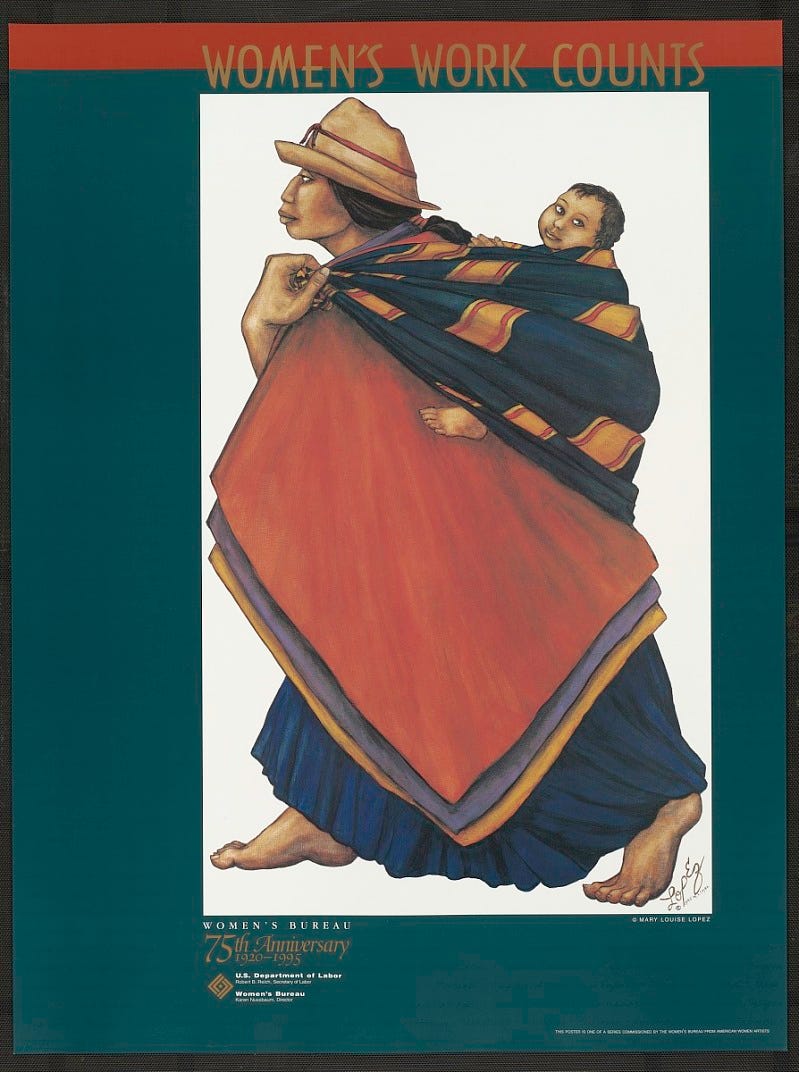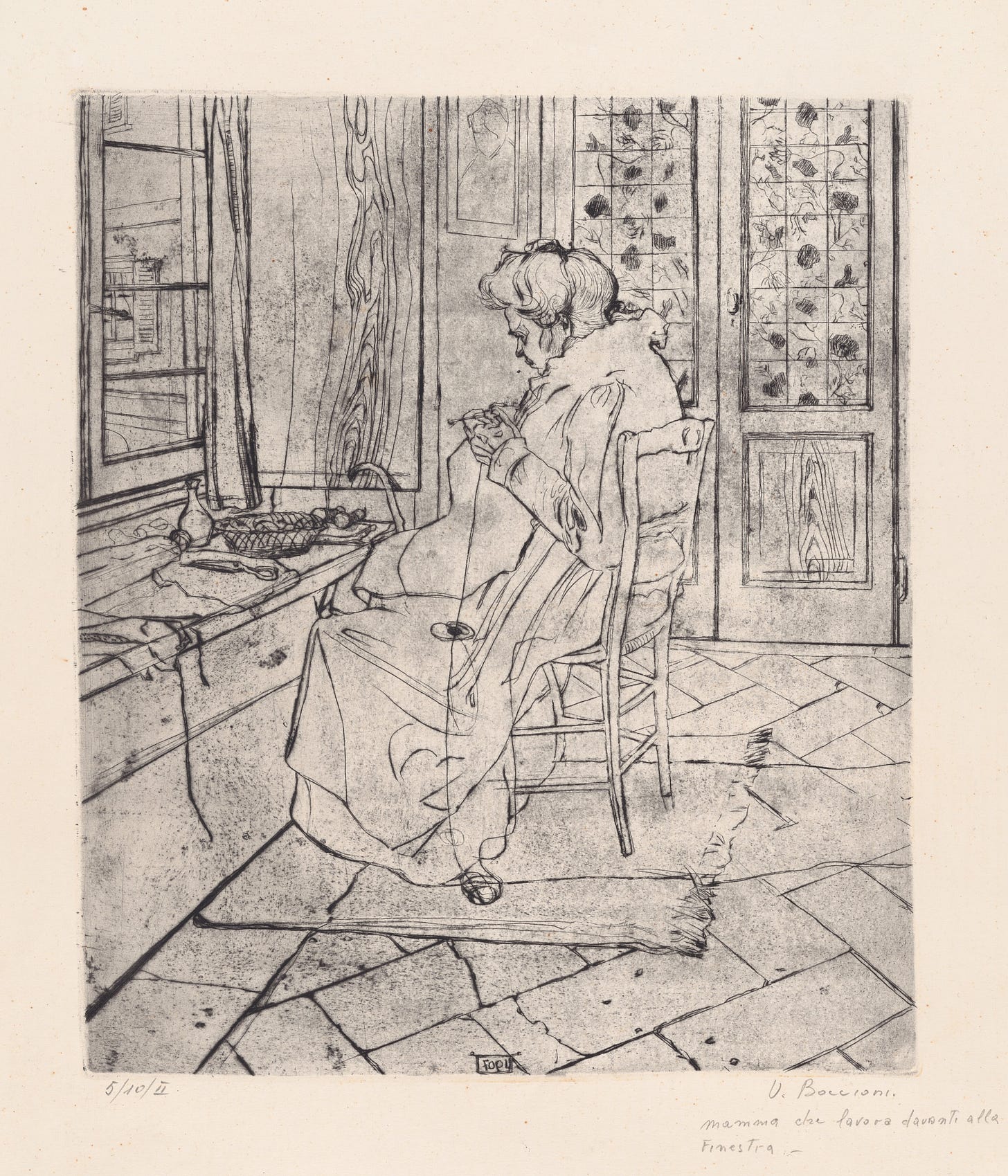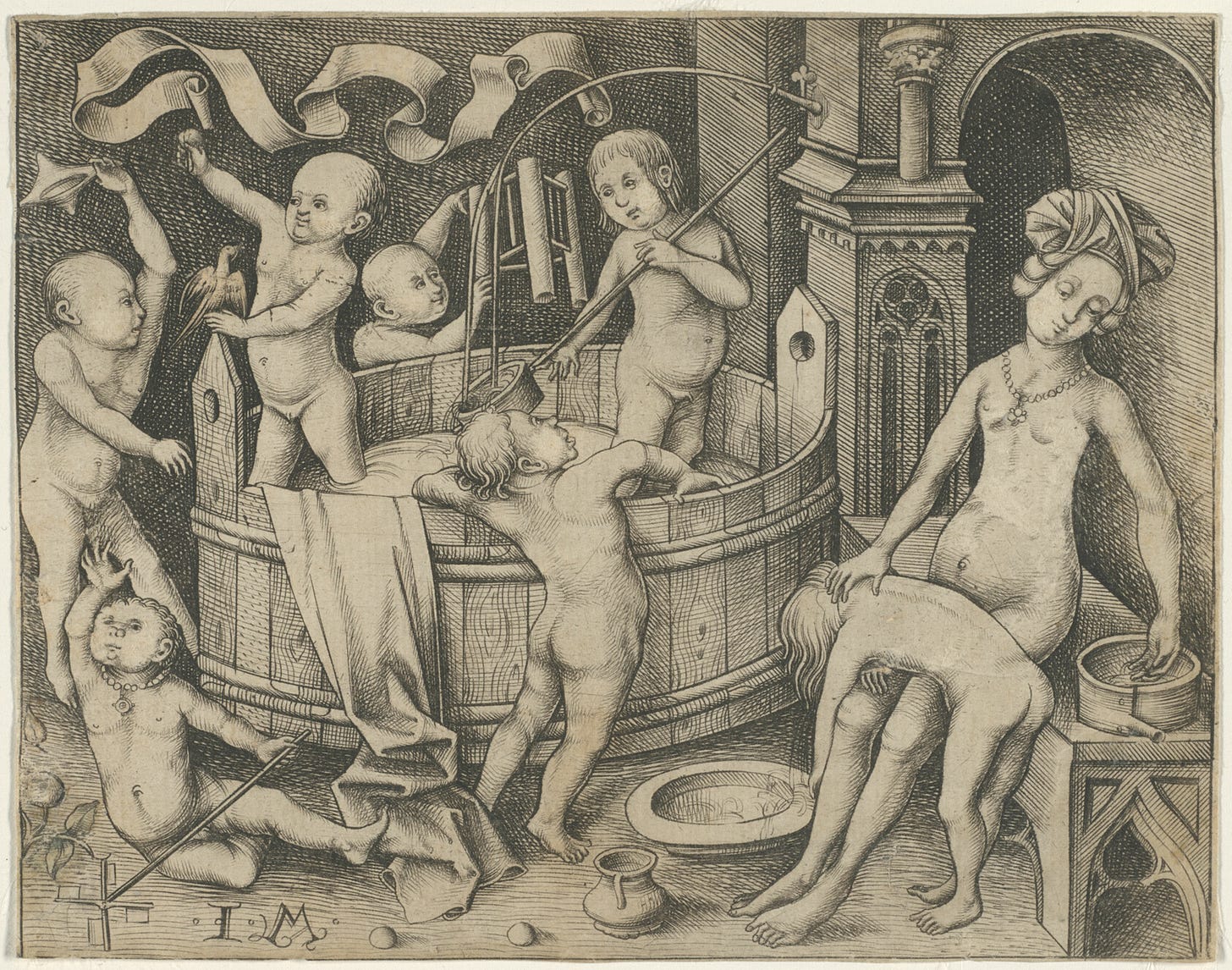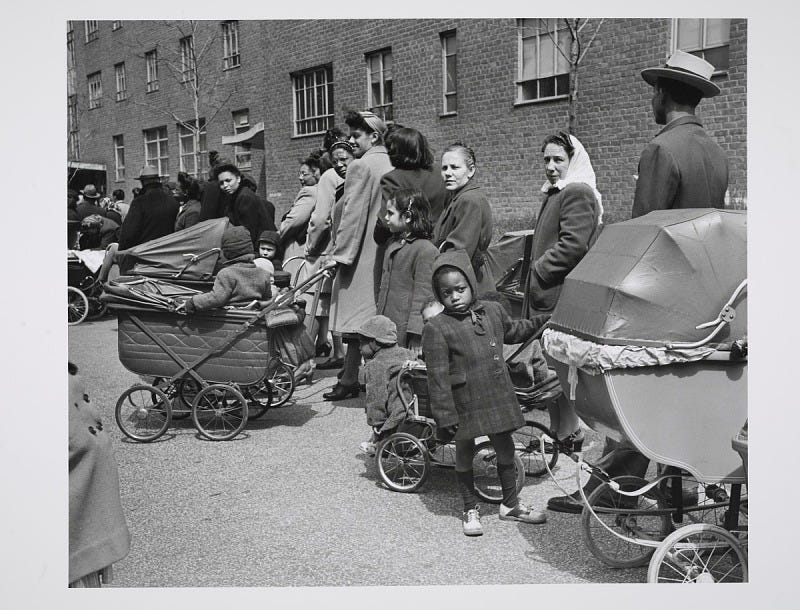Gentle reader,
I’m going to tell you something I’m not supposed to say, something unspeakable. I’m going to get dumped on for saying it. I think I should tell you anyway.
But first: some context and some theology of finitude.
There is no work-life balance. There is only the blessed limit of finitude and the blessed infinity of love.
I’m a mother of four. I have worked outside the home—either as a Ph.D. student or as a professor—for the full 22+ years I have been a mom. I love my babies, and I love my job. My empty nest years are approaching. (Maybe. Nests are unpredictable). And I’m reflecting on my full nest years.
Today, I’m working at home until it’s time to go over to the seminary for my late afternoon class, which will also be about the time the teenagers start pouring back into the household from their schools and the time when they need something resembling dinner.
Mary Louise Lopez, 1920, A poster commemorating the 75th anniversary of the Women's Bureau.
Today, I’m trying to think about a book project, and about two graduations (one high school, one college) coming up for our kids, and the classes I’m teaching, and the rugs I put in the laundry this morning because the dog threw up on them again, and emails I need to get back to, and the complexities of work bureaucracy.
Today, I’m grateful to my mom, who is managing hemming the senior recital dress and planning the senior recital refreshments. Today, I’m grateful to my husband, who will manage the evening for the kiddos, even as he also manages his work-outside-the-home.
And there’s still so much undone.
And that’s as it should be, because finitude is a gift. It reminds us that we’re not God. It teaches us to trust in the One who is infinite, and it teaches us how to love the finite things we get the finite time to love.
“The world is bursting with wonder, and yet it’s the rare productivity guru who seems to have considered the possibility that the ultimate point of all our frenetic doing might be to experience more of that wonder.” — Oliver Burkeman, Time Management for Mortals
I found out I was pregnant with our oldest a few weeks before I started my Ph.D. program. I went to the director of graduate studies in tears. He laughed his good-natured laugh and asked “what do you kids think is going to happen when you get married,” and he assured me that we would make it work.
We did. But I felt it.
I felt being a body, a visibly mammalian, female body, as I sat in seminars, battling imposter syndrome and exhaustion and the finite number of pages it’s possible to read or write in a day. I wrote a dissertation about bodies, in part because of this start to my doctoral work.
I’ve often credited the existence of my baby daughter for helping me get through my program quickly. I wasn’t going to waste time, I said, because I was a mother. There’s some truth in that. But it’s also much more complicated than that implies.
Umberto Boccioni, Mia madre che lavora [My Mother Working], 1907
How did I do it? I did and I didn’t.
My husband cut his own graduate study to part time so he could take a job and take on more baby hours. We paid fellow students for some childcare. My mom walked us through those first dazed weeks, when I couldn’t figure out how to shower or make a sandwich. I was lucky to have student friends who were also parents of small children. My professors politely ignored it when I disappeared from seminars to give birth, and our baby became a preschooler and ran through the halls of the Divinity school, her little red shoes a bright light and a warning.
“The reason time feels like such a struggle is that we’re constantly attempting to master it—to lever ourselves into a position of dominance and control over our unfolding lives so that we might finally feel safe and secure, and no longer so vulnerable to events.” — Oliver Burkeman, Time Management for Mortals
Our second child was born at the end of my first year of teaching. This one was harder than the grad school pregnancy. Grad students have a lot of flexibility. (Professors do too, but not quite as much as students.) How did I do it? I did and I didn’t.
“It’s not the freshman 15,” I joked to my class of freshmen; “I am, in fact, pregnant.” Kind colleagues covered my last classes of the semester, without any extra pay for their efforts. My husband was working part time to make some room in our lives and schedules, and my mom offered to stay with us a couple of nights a week, caring for the children, so that he could get his work days in. (She would do this for the third baby too).
Baby three came a couple of years later. How did I do it? I did and I didn’t.
In labor, I cried to my midwife, “how will I do it? I can’t even handle the first two!” She smiled; “third babies have a way of just easing into families.” I don’t know if she was right, but this particular baby slept through the nights, a miracle. Thanks to a few other miracles, I arranged an actual maternity leave. I interviewed for a new job with the baby and my husband in tow, the department chair graciously arranging breaks in my heavy interview schedule so I could nurse.
“ … develop a taste for having problems. Behind our urge to race through every obstacle or challenge, in an effort to get it ‘dealt with,’ there’s usually the unspoken fantasy that you might one day finally reach the state of having no problems whatsoever.” — Oliver Burkeman, Time Management for Mortals
By the birth of baby four, I hardly had a chance to take a breath. How did I do it? I did and I didn’t.
He came just before Christmas, jaundiced and beautiful, and I was back in the classroom two weeks later. (My Christian institution would finally begin offering parental leave a few years later; only for faculty; no luck for staff).
The length of time I nursed grew exponentially shorter with each child: 3 years, 2 years, a year, 6 months. I loved nursing, but when I gave that last child a bottle of formula, I felt a weight tumble off my back. He was still happy and healthy, despite my failure at “doing it all” the way some people want to define it.
And we think of the problem—how will she do it? How will she balance mothering and a career?—as a baby-centered problem. No doubt, birth and postpartum needs are enormous, but the needs don’t go away.
There’s potty training and finding a preschool and failing to get the snack to the preschool on the assigned snack day (don’t worry, by the third kid, the preschool teachers expected us to forget to provide).
There are activities and decisions about activities and driving the kids to activities. There are a million, million, infinite needs in this beloved, finite world. And women bear the care for those needs in a way that men don’t. We get the judgment, when our meeting of the needs doesn’t look quite right.
I was lecturing on the glories of the Triune God, my mind and heart awhirl in trying to share beauty and truth. A student raised his hand and said, “where are your children right now?”
“The handy thing about being a father is that the historic standard is so pitifully low.” ― Michael Chabon, Manhood for Amateurs
And, then, parenting teenagers is a category unto itself. I thought the kids wouldn’t need me as much, when they grew older. I longed for the day when they’d all be in school, which came a full 15 years into my life as a mom. But they need us more, now, really, and I see that the need will always be there and the need will always change and grow.
Here’s a picture I posted to Instagram in 2018.
I labelled it, “Sunday dinner. #classy #makingiteasytokeepupwiththeJoneses #howdoesshedoit.”
Do you know these nasty little pizzas? They’re a staple in our house, though we put them in the air fryer these days, because we’ve modernized around here.
We can’t do it all. If she does it, she does it with a team and she does it in finitude. It’s not “lean in;” it’s love hard, and help each other as much as you can. It’s grace when it works and grace when it doesn’t work and grace to get through the days and years.
The Children’s Bath, 1480/90, Israhel van Meckenem the Younger
Ok, here’s my big confession:
I have not been who I wanted to be, either in my work at home or my work outside it. I have not been the mother I wanted to be, and I have not been the teacher-scholar-writer I wanted to be.
I did the work and I cared for the kids, and I failed to do the work and I failed to care for the kids.
Inasmuch as it has worked, it hasn’t been me “doing it,” all by my lonesome. Note all my husband and mom (and lots of people and factors not named) have been doing along the way.
(We need structural and societal solutions so that managing doesn’t depend on the luck of having your own team, but that’s a different piece …)
Sometimes, when I was with my wild kids, I wanted nothing more than the solitude of my writing desk.
And vice versa.
And sometimes, when I was with my kids, I never wanted to go back to “work” at all.
And vice versa.
“Every day is like a kid's drawing, offered to you with a strange mix of ceremoniousness and offhand disregard, yours for the keeping. Some of the days are rich and complicated, others inscrutable, others little more than a stray gray mark on a ragged page. Some you manage to hang on to, though your reasons for doing so are often hard to fathom. But most of them you just ball up and throw away.” ― Michael Chabon, Manhood for Amateurs
It’s not possible to have it all or do it all. The gift of finitude has been knit into being human, reminding us, always, that we can’t do it all.
The job has suffered for the kids and the kids have suffered for the job. But, as Christians, we know that while suffering is never to be glorified, it’s also not something to be avoided at any cost. The goal of much contemporary parenting may be to protect kids from any hint of suffering, but the goal of Christian parenting is to make disciples for the One who suffered and died for our sake.
But, oh, how I wanted to have been better, done more, poured out more. Both at home and at work.
The tempter mocks, “oh, how you’ve failed. You should have done so much more.”
(This is not totally unlike the temptations of Jesus in the desert, wherein Satan kept pressing Jesus to reject his human finitude, and so to reject his human dependence on the Father in the Spirit.)
I couldn’t have. I shouldn’t have. I did what I could. I’m only so much, which is to say, I’m a human as God created humans to be: finite.
I can’t be everything. Only God can.
Moms, Kids, and Carriages, Joe Schwartz, American, 1913 - 2013
I wanted the kids. I wanted the job. I wanted both of them with my whole self, and I would have been worse for them, if I hadn’t had both. I wouldn’t have flourished or been faithful, if I hadn’t had both. What’s true for me—the wanting both the kids and the job thing—isn’t true for everyone, but the fact of finitude sure is.
And the kids and the job aren’t two separate things. What I’ve been, to each, has been shaped by the other. For the worse, but also for the better.
(I think of D. W. Winnicott’s notion of the “good enough mother,” of the claim that children need unmet needs in order to relate rightly to the world. As it turns out, perfect mothers would not be perfect for finite humans. I think of Sarah Lacy’s book, A Uterus Is a Feature, Not a Bug, and her insights into the ways being a mother is good for being a worker and the other way around.)
“The hazard in any such discussion of ‘what matters most’ in life, though, is that it tends to give rise to a kind of paralyzing grandiosity.” — Oliver Burkeman, Time Management for Mortals
The number one question young women want me to talk about? Can I have a job and be a mom?
Would I tell them, “no”?
Would I say, “no, because you can’t do it all.”
I would not.
Instead, I’m learning to say, “praise God, you can’t do it all. So you’re free to choose faithfulness the best way you can imagine it. You’re free to muddle through.”
God called me to both kids and career. God knew and loved my finitude, and God walked with me, in my finitude.
I’m not enough. You’re not enough. Only God is enough. In Christ, our finitude is enough. In Christ, love multiplies, like loaves and fishes.
Here’s what I’m NOT saying:
“have a career, so you can experience the gift of finitude.”
What I AM saying is this:
“we’re all going to experience the finitude, the working-moms and the stay-at-home-moms both. We’re all going to flounder and fail and experiment and be surprised by what we didn’t know.”
I remember being 25-years-old, spending an afternoon with my preschooler, in our little rented house near the university. The sun was out, burnishing the floorboards and warming the sleeping dog. It was a good day. And I remember thinking, “I don’t think we’ve messed this parenting thing up. I think we’ve gotten it right so far.”
Ah, 25! I see that 25-year-old, thin and delusional, and I know that she was so inadequate to all the trials that would come, and I love her in her finitude.
How could she have made it through to today, if she’d persisted in thinking she was enough?
How could I have learned to love the children well, in their very finite finitude, if I hadn’t had to learn my own finitude so fully?
How might I have stumbled over the stumbling block that is the infinite God becoming finite for us, if that God hadn’t walked beside me in my tears and my insufficiencies?
Here’s what I want to say to young women, contemplating all the ways God might be calling them to love and work: you won’t be enough.
(If you have kids, you won’t be enough. If you don’t have kids, you won’t be enough. If you stay-at-home, you won’t be enough. If you work-outside-the-home, you won’t be enough.)
Embrace what God is calling you to:
work,
home,
both,
doubtless some unique mess that is yours alone, doubtless something that will surprise you and won’t look the way you thought it would look.
And relax into the truth that you won’t be enough. The good human life is the finite life, connected to the infinite life and love of God.
Praise God, who will be enough, who will be beside you, who is all in all, whose grace is always sufficient, for we creatures who were made for grace.
Grace & peace,
BFJ
This piece contains associate links.
If this piece has treated you well, I’m always grateful if you’ll forward, share, and subscribe.












You speak the truth
Love Mom
Finitude, Grace, and the Infinite - got to love it. And so much like the witness of Christian Scripture. Thank you for sharing.